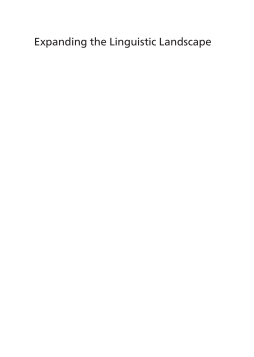
Additional Information
Book Details
Abstract
This book provides a forum for theoretical, methodological and empirical contributions to research on language(s), multimodality and public space, which will advance new ways of understanding the sociocultural, ideological and historical role of communication practices and experienced lives in a globalised world. Linguistic Landscape is viewed as a metaphor and expanded to include a wide variety of discursive modalities: imagery, non-verbal communication, silence, tactile and aural communication, graffiti, smell, etc. The chapters in this book cover a range of geographical locations, and capture the history, motives, uses, causes, ideologies, communication practices and conflicts of diverse forms of languages as they may be observed in public spaces of the physical environment. The book is anchored in a variety of theories, methodologies and frameworks, from economics, politics and sociology to linguistics and applied linguistics, literacy and education, cultural geography and human rights.
This fascinating volume makes a substantial contribution to the study of the linguistic landscape. Adopting an interdisciplinary approach, it brings together thought-provoking theories and research methodologies. It is a must-read not only for scholars but for all those interested in the study of language in the public space.
Martin Pütz is Professor of English Linguistics at University of Koblenz-Landau, Germany. His research interests include applied cognitive linguistics, linguistic landscapes and multilingualism in Africa.
Neele Mundt is Lecturer in English Linguistics at University of Koblenz-Landau, Germany. Her research interests include multilingualism, language attitudes and identity, and language and education in Cameroon.
This volume changes the landscape of Linguistic Landscapes research. It widens the disciplinary space, ploughs deep into theoretical soil, shines the light on budding ideas, and grows an orchard of fresh intellectual fruits.
This volume makes a dynamic contribution to the developing field of Linguistic Landscape research. Using insights from around the world, the authors show novel and imaginative ways of renegotiating concepts of 'language' and 'landscape' in the light of multimodality, language power and conflict, discourse, and translation within a changing global culture.
Table of Contents
| Section Title | Page | Action | Price |
|---|---|---|---|
| DOI https://doi.org/10.21832/PUTZ2159 | iv | ||
| Contents | v | ||
| Preface | vii | ||
| Contributors | ix | ||
| Multilingualism, Multimodality and Methodology: Linguistic Landscape Research in the Context of Assemblages, Ideologies and(In)visibility: An Introduction | 1 | ||
| Part 1 General Issues, Methodology and Linguistic Landscapes as a Pedagogical Resource | 23 | ||
| 1 Linguistic Landscape after a Decade: An Overview of Themes, Debates and Future Directions | 25 | ||
| 2 Methods and Techniques for Linguistic Landscape Research: About Definitions, Core Issues and Technological Innovations | 38 | ||
| 3 Learning to Translate the Linguistic Landscape | 58 | ||
| Part 2 Broadening the Field of Semiotic Landscapes: Semiotic Assemblages, Multimodality and Contemporary Urban Spaces | 73 | ||
| 4 Linguistic Landscapes and Semiotic Assemblages | 75 | ||
| 5 The Art of Silence in Upmarket Spaces of Commerce | 89 | ||
| 6 Multimodality in the City: On the Media, Perception and Locatedness of Public Textscapes | 115 | ||
| 7 Multilingual Audio Announcements: Power and Identity | 132 | ||
| Part 3 Expanding Linguistic Landscape Studies: Power Relations, Acts of Resilience and Diachronic Changes | 151 | ||
| 8 Linguistic Landscapes and the African Perspective | 153 | ||
| 9 Slogans as Part of Burkina Faso’s Linguistic Landscape during the Insurrection in 2014 | 180 | ||
| 10 Investigating the Bilingual Landscape of the Marshall Islands | 203 | ||
| 11 Linguistic, Ethnic and Cultural Tensions in the Sociolinguistic Landscape of Vilnius: A Diachronic Analysis | 229 | ||
| 12 Attitudes towards Visual Multilingualism in the Linguistic Landscape of the Ruhr Area | 264 | ||
| Index | 300 |
